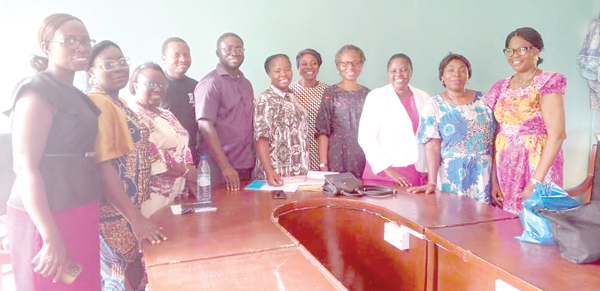
Globally, women journalists and media workers face increasing offline and online attacks and are subject to disproportional and specific threats; they are often exposed to stigmatisation, sexist hate speech and trolling, physical assault, rape and sometimes, murder.
Worldwide, there is a decline in press freedom and a drop in the number of countries where journalists can work safely and security concerns can be particularly prevalent for women journalists who face the double burden of being attacked both for being journalists and women.

This is the reason the Center for Public Service; TULANE University in the United States sponsored a community engagement for women journalists in Oyo State in collaboration with the Nigeria Association of Women Journalists (NAWOJ), the Institute of Church and Society and the Gender Alive Foundation, with a vision to providing a safe space for women journalists to discuss their workplace experiences and provide support for one another.
The women journalists shared experiences on issues they had that were peculiar to them as women; harassment and attacks that often lead to self-censorship, gender harassment, unwanted sexual attention and sexual coercion, stunted promotion, negative effects on family life and mental as well as emotional issues in maintaining home-work life balance.
Many of the women that participated spoke about how they carry the same burden as men professionally but get relegated when there is need for them to be promoted to the position of authority, adding that they usually get excuses like they won’t be able to keep odd hours because of children but had never been given soft landing when being given assignments.
While emphasizing that many media houses organizations especially privately owned media still have the invisible glass ceiling for women, they said that when assignments are given, few superior officers consider gender.
They also raised the issue of senior female journalists being the major enablers of women victimisation as many expect their subordinates to also experience the unpleasantness they faced while climbing up.
“You will hear statements like I covered this beat while pregnant and I slept in the office even when my due date is near. In fact, I was once told by my female boss that I moved to the labour room from the newsroom so what is special about your condition than the fact that you want to be lazy,” one of the women said.
“In journalism, everyone is equal and there is no gender until there is a need to promote someone to position of authority. That is when issues of marital status; oh, she is divorced, how can she manage people comes up. I have never heard them ask a divorced man how he will manage a bigger position when he cannot manage his home but women go through this all the time. Indeed, we are all gentlemen of the press until it is time for promotion, that is when gender comes in,” another female journalist said.
“In fact, the professional body is not left out, there is an unwritten code that women cannot have ideas or stand on their own but need the male counterparts to get anything done, consequently, they are limited in their aspirations as the men are expected to decide who gets what and how far any woman in the body can go,” another journalist explained.
The participants added that the situation has made many women journalists to believe that their best can never be enough as it won’t make a difference when it matters and this affects productivity; some women journalists avoid reporting certain stories to avoid victimisation especially when it comes to gender roles and expectations.
“Even in the newsroom, some editors shut down the ideas of some female journalists as it seems unduly liberal and doesn’t conform to their beliefs on gender roles and societal expectations. In such situations, you bury your ideas as you cannot be seen to antagonise your editor’s idea. Female editors that endure toxic homes do not respect subordinates that have the courage to walk away from such, so they label them and this affects their growth,” another journalist said.
They consequently called on fellow female journalists to buckle up and stay to the true path irrespective of what they face. “Do not do what some seniors did to you to others so the terrible cycle doesn’t continue. It is time to be the change we advocate,” they said.
They said majority of threats, intimidation and abuse directed towards women in the workplace is perpetrated by male bosses, supervisors and co-workers supervised and enabled by some female who have been conditioned to think such is normal and this is why most incidents of harassment and violence at the workplace are never reported, even though the majority of women who experienced them said they were psychologically affected.
There was a consensus that it is time for women journalists to collaborate to identify and implement good practices and share recommendations to sensitise each other on freedom of expression with a gender focus.
ALSO READ: [VIDEO]: Let church members attend Redeemer’s schools for free, Lege urges Adeboye








